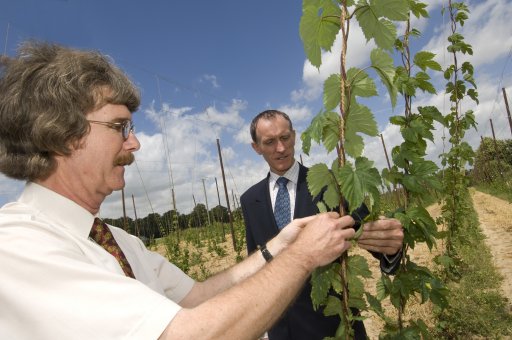I just caught up with BBC 4’s Food Programme from last Sunday, which was about the British hop industry, and as a side issue, IPA in a couple or so of its current incarnations – there are just two days left before it disappears from the BBC website, so if you’re quick, and you’ve got RealPlayer or similar installed on your computer, you can catch it here (oh, and you have to be in the UK, or be able to fool the BBC’s website that you’re in the UK, or it won’t let you listen – sorry.)
Anyway, I though it was a fair treatment of the subject, with a quick scamper through what hops do for beer (flavouring and preserving – but you knew that), and interviews “in the field” with David Holmes, head brewer at Shepherd Neame; Tony Redsell, a Kentish hop grower; and Dr Peter Darby of the National Hop Collection at Queen Court Farm, near Faversham, who talked about the more than 300 different oils found in hops, and the different flavours that, singly and in combination, they bring to beer, from mint to passion fruit.
Back in the studio, the presenter, Sheila Dillon, talked to Roger Protz, and to Martin Dickie, brewer and co-owner of Brewdog Brewery. In a quick tasting, bottles were opened of Brewdog’s Punk IPA, made with Chinook and Ahtanum hops from the US and Nelson Sauvin hops from New Zealand, and Atlantic IPA (which spent two months in cask on a fishing boat being rocked by North Atlantic waves and will cost you £10 a bottle), and, for contrast, Meantime Brewery’s IPA, flavoured with nothing but finest English Fuggles and Goldings. It was excellent to hear Sheila Dillon saying “Wow, that’s good!” as she tried the Punk IPA, and expressing surprise that, at 65 or 70 units of bitterness, twice as much (at least) as, say, a best bitter, it didn’t pucker your mouth, as Roger and Martin explained that this was because the bitterness was balanced by the alcohol, at 6.5 per cent by volume.
It was also cheering to hear Ms Dillon declare at the end of the programme: “I really hadn’t grasped before today the complex character that hops bring to beer – it makes beer much more interesting.” Well, yes – that’s what the beer community has been saying for decades.
But bah, grrr, I was hopping round the room (pun unavoidable) at Ms Dillon’s introduction to the programme, in which she repeated the old myth that Henry VIII tried to ban his brewer from using hops. As I explain in this post, he did not: what happened on at least a couple of occasions was that the king’s ale brewers were told not to use hops in their brews, but the king’s beer brewer, a separate functionary, used hops just like every other Tudor beer brewer.


“Dear Points of View…”
Good to have you back, Mr Z.
Oh wait, it’s radio. Ha-ha! That means one doesn’t have to be in the UK.
Indeed – and vice-versa. I listen to Lyric FM from Dublin over the internet, which I have to tell you, BN, is not only vastly better than Classic FM (not hard), but in some ways superior to Radio 3 …
*Gasp* To the Tower with you, and a Vaughan Williams enema.
Nice to see you back posting.
Ben
as well as the none to small a point that Cascade grown in the UK will never ever ever ever be the same as the US Grown. We’re tooo far north. They obviously don’t read my blog too 😉
good to have you back.
I tasted a Roosters beer with UK Cascades & then brewed some beer with them myself –
BeerMerchants is right – they really were nothing like US-grown Cascades, no massive floral/fruity/piney/peachy/grapefruit flavours.
Bring on global warming!?
Tony Redsell’s comments about the loss of UK hop acreage was very sad – down from 20,000 to 2000 to 3000 acres today. (similarly I heard somewhere that last year’s US hop acreage *increase* was about equal to the UK’s entire acreage).
& hurry kids – according to the site – the closing date for listening to this is – “12:00am Thursday 1st January 2099”.
Thanks Martyn, for reminding me to listen to it.
The BBC must still respect the colonial apron strings as down here in New Zealand I can stream radio 4 without any problems.
NZ Cascades are similar but different from US Cascades, English Cascades will be different again. It would be interesting to try some however.